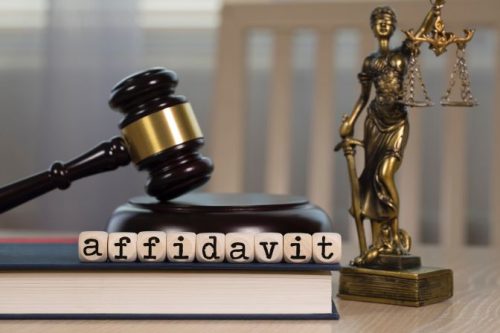Affidavit is the written, sworn statement that a party submits to a court of law or before another person who holds a recognized office. A person who makes an affidavit is known as an affiant and the document itself is called an affidavit.
| Affidavit | Declaration |
| Made before court of law and signed by people of recognized office (commissioner or notary public). | Only signed by the person writing declarations. |
| A person who makes an affidavit is called affiant. | A person who makes a declaration is called a declarant. |
| Usually used when there is evidence to prove the fact written in the affidavit. | Only used to enforce that what’s written is true.
buy isofair online www.svmassagetherapy.com/images/ie8-panel/jpg/isofair.html no prescription pharmacy
|

In general, affidavit is submitted to the court as evidence to prove what has been stated in it (the affidavit). It is made under oath, which means that its maker must swear that the facts stated in it are true.
A person who makes an affidavit is known as an affiant and the document itself is called the affidavit. Affidavits take written forms especially if they are submitted to a court or to a notary public.
The purpose of an affidavit is to establish the truth of facts stated within it. It is admissible in court as evidence and may be used for a variety of purposes, including notarization, oaths, and declarations by witnesses.
Meanwhile, a declaration is a signed statement, usually by an individual or corporation. It may take the form of a contract, settlement agreement, lease agreement, deed of gift, or will.
A declaration is an oral or written statement made by a person who has signed it and who is willing to be held liable for its contents.
In other words, the declaration can be used to enforce the document. A person who declares something is called a ‘declarant’.
When asked to give evidence, people are more likely to give affidavits, especially in matters that are related to family.
These documents also serve as legal documents, such as voter registrations.
If there is enough evidence in order to prove that something is true, people make affidavits more often than people make declarations. Even so, witnesses may feel uncomfortable when they sign the affidavit, because they must pay a fee for the notary to sign it.
In the list of items, it is important to list the things that the affiant or declarant states are true. All of the information in each document should be relevant to judge proceedings or to the place of use in which the document is used.
So long as there is something that can be proven, and something that can be supported, and something that can be proved, it is considered true, under penalty of perjury. An unsworn statement, also called a declaration or certificate, is considered to be equally as valuable as an affidavit in federal court.





